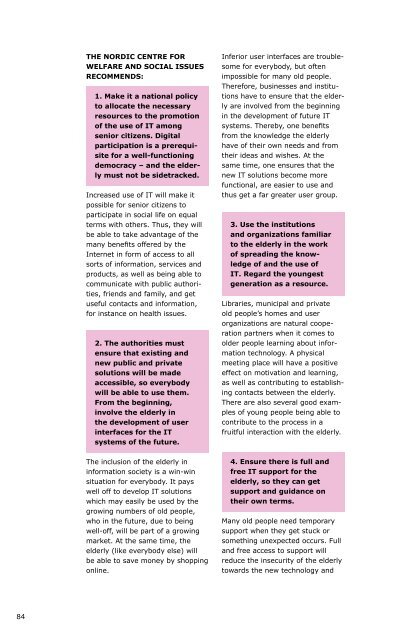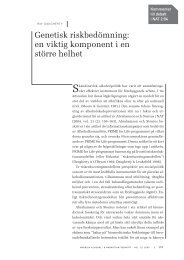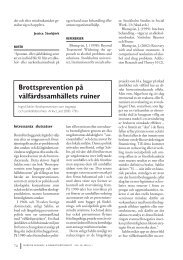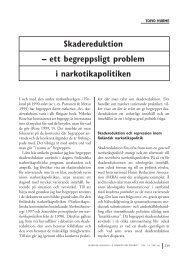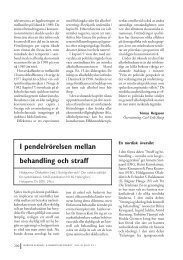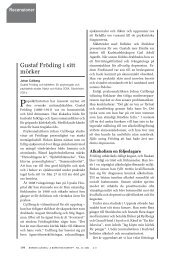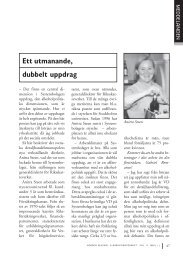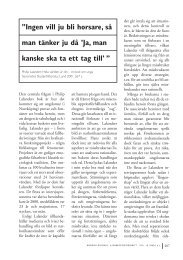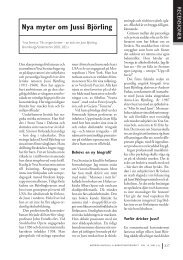You also want an ePaper? Increase the reach of your titles
YUMPU automatically turns print PDFs into web optimized ePapers that Google loves.
84<br />
THE NORDIC CENTRE FOR<br />
WELFARE AND SOCIAL ISSUES<br />
RECOMMENDS:<br />
1. Make it a national policy<br />
to allocate the necessary<br />
resources to the promotion<br />
of the use of IT among<br />
senior citizens. Digital<br />
participation is a prerequisite<br />
for a well-functioning<br />
democracy – and the elderly<br />
must not be sidetracked.<br />
Increased use of IT will make it<br />
possible for senior citizens to<br />
participate in social life on equal<br />
terms with others. Thus, they will<br />
be able to take advantage of the<br />
many benefits offered by the<br />
Internet in form of access to all<br />
sorts of information, services and<br />
products, as well as being able to<br />
communicate with public authorities,<br />
friends and family, and get<br />
useful contacts and information,<br />
for instance on health issues.<br />
2. The authorities must<br />
ensure that existing and<br />
new public and private<br />
solutions will be made<br />
accessible, so everybody<br />
will be able to use them.<br />
From the beginning,<br />
involve the elderly in<br />
the development of user<br />
interfaces for the IT<br />
systems of the future.<br />
The inclusion of the elderly in<br />
information society is a win-win<br />
situation for everybody. It pays<br />
well off to develop IT solutions<br />
which may easily be used by the<br />
growing numbers of old people,<br />
who in the future, due to being<br />
well-off, will be part of a growing<br />
market. At the same time, the<br />
elderly (like everybody else) will<br />
be able to save money by shopping<br />
online.<br />
Inferior user interfaces are troublesome<br />
for everybody, but often<br />
impossible for many old people.<br />
Therefore, businesses and institutions<br />
have to ensure that the elderly<br />
are involved from the beginning<br />
in the development of future IT<br />
systems. Thereby, one benefits<br />
from the knowledge the elderly<br />
have of their own needs and from<br />
their ideas and wishes. At the<br />
same time, one ensures that the<br />
new IT solutions become more<br />
functional, are easier to use and<br />
thus get a far greater user group.<br />
3. Use the institutions<br />
and organizations familiar<br />
to the elderly in the work<br />
of spreading the knowledge<br />
of and the use of<br />
IT. Regard the youngest<br />
generation as a resource.<br />
Libraries, municipal and private<br />
old people’s homes and user<br />
organizations are natural cooperation<br />
partners when it comes to<br />
older people learning about information<br />
technology. A physical<br />
meeting place will have a positive<br />
effect on motivation and learning,<br />
as well as contributing to establishing<br />
contacts between the elderly.<br />
There are also several good examples<br />
of young people being able to<br />
contribute to the process in a<br />
fruitful interaction with the elderly.<br />
4. Ensure there is full and<br />
free IT support for the<br />
elderly, so they can get<br />
support and guidance on<br />
their own terms.<br />
Many old people need temporary<br />
support when they get stuck or<br />
something unexpected occurs. Full<br />
and free access to support will<br />
reduce the insecurity of the elderly<br />
towards the new technology and


